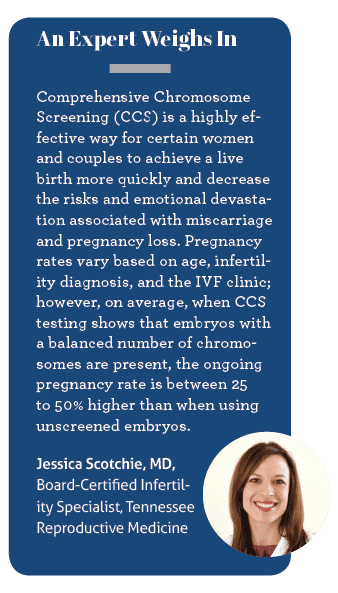Comprehensive Chromosome Screening (CCS) is offering new hope to those struggling with infertility.
What is Comprehensive Chromosome Screening (CCS)?
Comprehensive chromosome screening (CCS) is used to detect chromosome number abnormalities in embryos (fertilized eggs). In reproductive medicine, the purpose of comprehensive chromosome screening is to increase the chance of transferring healthy embryos into the uterus.
 CCS is most often used in the setting of in vitro fertilization (IVF), the most common type of assisted reproductive technology (ART) used to help women successfully conceive a child. In a technique called array comparative genomic hybridization (aCGH), fluorescent dye is used to analyze the genetic material of embryos.
CCS is most often used in the setting of in vitro fertilization (IVF), the most common type of assisted reproductive technology (ART) used to help women successfully conceive a child. In a technique called array comparative genomic hybridization (aCGH), fluorescent dye is used to analyze the genetic material of embryos.
Why You Might Need CCS
Normally, there are 23 pairs of chromosomes in each human embryo, for a total of 46 chromosomes. While some chromosome abnormalities are compatible with life (such as Down syndrome, Klinefelter syndrome, and Turner syndrome), most aren’t.
The purpose of comprehensive chromosome screening (CCS) is to increase the chance of transferring embryos into the uterus that do not have recognizable chromosomal abnormalities. In other words, the technology can detect which embryos are balanced in their chromosome number, and therefore, more likely to implant and become a child.
The Perks of CCS
In terms of accurately detecting the genetic health of an embryo, CCS is far superior to standard embryo screening. Standard embryo screening was based on grading the appearance of the cells. However, there is no clear correlation between appearance and genetic health.

